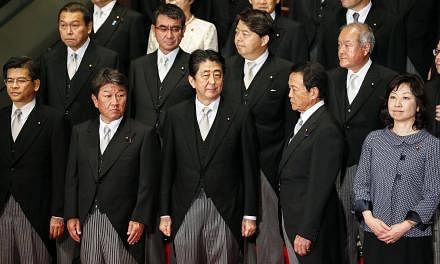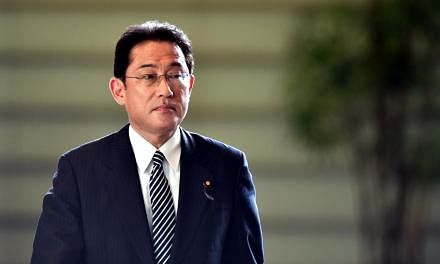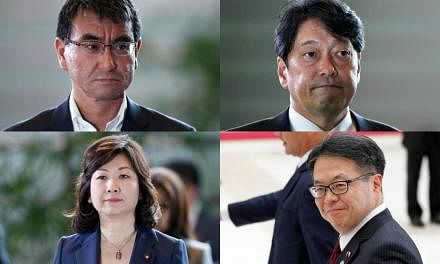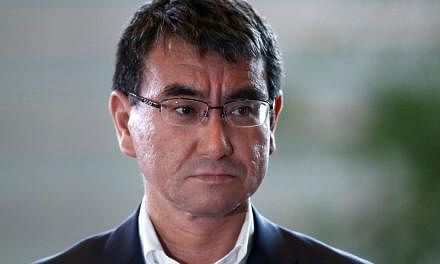TOKYO (REUTERS) - Japanese Prime Minister Shinzo Abe reshuffled his cabinet on Thursday (Aug 3) in a bid to shore up plunging public approval ratings, largely opting for veteran ministers over fresh faces except for Foreign Minister Taro Kono, known as a bit of a maverick.
Finance Minister Taro Aso, Trade Minister Hiroshige Seko and Chief Cabinet Secretary Yoshihide Suga all kept their jobs.
Here are some facts about a few notable incoming ministers.
FOREIGN MINISTER TARO KONO
Mr Kono, 54, the new foreign minister, is known for his close ties with Washington and his reputation as a political maverick who does not shy away from speaking his mind even on politically sensitive issues.
Educated at Georgetown University and fluent in English, Mr Kono also worked as an aide for several US politicians before returning to Japan.
Mr Kono is the son of retired politician and former chief cabinet secretary Yohei Kono, who authored a landmark 1993 apology to "comfort women" forced to work in Japanese military wartime brothels.

In 2002 he donated part of his liver in a successful attempt to save the life of his father, who was suffering from cirrhosis.
ECONOMY MINISTER TOSHIMITSU MOTEGI

A longtime ruling party policy veteran, Mr Motegi, 61, previously served as trade minister under Mr Abe when he returned to power in 2012, tackling issues such as negotiations for the Trans-Pacific Partnership (TPP) free trade pact.
Educated at prestigious Tokyo University and later receiving a master's degree from Harvard, Mr Motegi became trade minister less than two years after the March 11, 2011 earthquake and tsunami set off meltdowns at the Fukushima Dai-ichi nuclear plant.
He was in charge of energy policy in 2013 when the government stepped in to help struggling plant operator Tokyo Electric Power Co (Tepco) deal with the crisis.
DEFENCE MINISTER ITSUNORI ONODERA

Mr Onodera, 57, was defence minister for about two years from December 2012, when Mr Abe returned to power.
He is seen as a safe pair of hands to take on the portfolio after predecessor Tomomi Inada stumbled with gaffes and missteps and was forced to quit less than a week before the reshuffle due to a cover-up scandal.
Mr Onodera headed a ruling Liberal Democratic Party (LDP) panel that has urged the government to acquire the ability to strike back at an enemy military facility and beef up its missile defence systems against threats such as from unpredictable North Korea's missile and defence programmes.
A native of Miyagi prefecture in northeastern Japan, hit hard by the 2011 tsunami, Mr Onodera studied at the Matsushita Institute of Government and Management, a training school for would-be politicians.
INTERNAL AFFAIRS MINISTER SEIKO NODA

Ms Noda, 56, is a prominent LDP lawmaker and veteran of several cabinet and party posts, who is sometimes spoken of as a possible future female prime minister.
When she was first elected to Parliament in 1993, she was the only female lawmaker in the more powerful lower house. In 1997 she became the youngest post-World War II cabinet minister, serving as Posts and Telecommunications Minister - a post now folded into her current portfolio.
In 2015, Ms Noda tried to challenge Mr Abe's re-election as leader of the ruling LDP but failed to get the backing of the 20 lawmakers needed to launch a formal bid. She told Reuters in late 2015 that she would "of course" make another bid when Mr Abe leaves office.
Ms Noda gave birth to a disabled son at age 50 after conceiving via donor eggs and in-vitro insemination. She has also been lambasted on the Internet for "wasting taxpayers' money" on his medical care.






